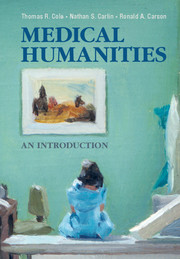Book contents
Introducing MedicalHumanities
Summary
Of the physician’s character, the chief quality is humanity, the sensibility of heart which makes us feel for the distress of our fellow-creatures.
– John GregoryIntroduction
“I had undergone three heart surgeries in two years,” Dr. Steven Hsi writes, “numerous tests, dozens of visits to doctors’ offices, extended stays in hospitals and long recuperative periods at home.” He continues:
I was 43 years old, a successful physician, married to a wonderful woman and blessed with two fine sons – all of it assaulted by a rare heart disease of such catastrophic power that it did more than threaten my life. It nearly destroyed my family.
Dr. Hsi and his family coped well enough, he writes, but no one, especially none of his doctors, asked him what he felt to be the most important questions: “What has this disease done to your life? What has it done to your family? What has it done to your work? What has it done to your spirit?” “Regardless of the considerable compassion and caring of many of them,” Dr. Hsi concludes, “no one asked the questions that needed to be asked. I have come to believe this oversight was the single most grievous mistake my doctors made.” Existential questions – questions about the meaning of life and death – are essential to medicine. This book is designed to help you engage the most important questions.
- Type
- Chapter
- Information
- Medical Humanities , pp. 1 - 18Publisher: Cambridge University PressPrint publication year: 2014



